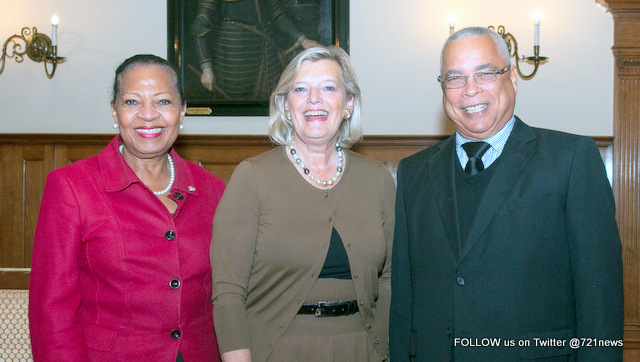
PHILIPSBURG, Sint Maarten – Minister Plenipotentiary Josianne Fleming-Artsen accompanied Prime Minister Marcel Gumbs to the Dutch First Chamber of Parliament, also referred to as the Senate, on Thursday, where he met with President Ankie Broekers-Knol.
Minister Plenipotentiary Fleming-Artsen stated on Thursday that President Broekers-Knol was very interested in the relationship between the Netherlands and Sint Maarten, and this was one of the points that was discussed in the meeting.
“Several issues were discussed during the meeting between the Prime Minister and President Broekers-Knol. The Integrity Chamber was one area, and the President wanted to know the latest developments, and how it was progressing.
“The financial situation of Country Sint Maarten was another area that was discussed. The meeting concluded where President Broekers-Knol looks forward to a strong productive relationship between the Netherlands and Sint Maarten,” Minister Plenipotentiary Josianne Fleming–Artsen said on Thursday in The Hague.
President Broekers-Knol has been serving in her capacity since 2nd July, 2013, and has been a member of the parliamentary group VVD (Liberal Party) in the Senate since 2nd, October 2001.
The Dutch First Chamber of Parliament has 75 members who are elected by the members of the 12 Provincial Councils. These elections are indirect in the sense that voters elect the members of the Provincial Councils, who in turn elect the members of the Senate.
The Senate’s main duties are in the legislative field, but it also plays a role in scrutinising the actions of the Government. Formally the Senate can only reject or accept legislation. In practice, however, it has rather more possibilities and debates are of importance.
For example, statements made by government ministers in debates on bills (draft legislation) can play a role in future lawsuits. The debates in the Senate contribute to the interpretation of a law. Moreover, members of the Senate can elicit undertakings from ministers about the implementation of a law.
Like their counterparts in the House of Representatives (Second Chamber of the Dutch Parliament), members of the Senate are entitled to put written questions to the Government.
The debate on the Government’s budget also gives them the opportunity to debate current and future policy with the government.
PHOTO CUTLINE: L to R: Minister Plenipotentiary Josianne Fleming–Artsen, Dutch First Chamber President of Parliament Ankie Broekers-Knol, and Prime Minister Marcel Gumbs. Photo by Nico van der Ven




























